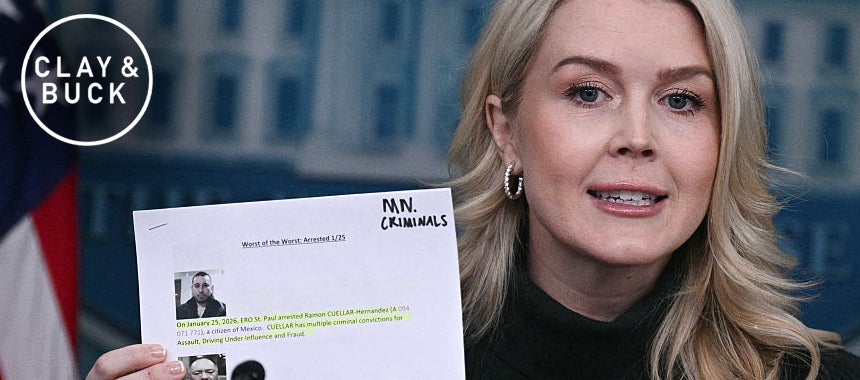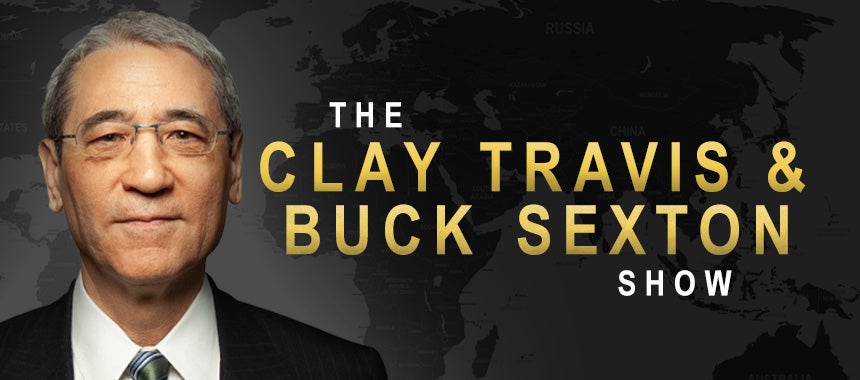Gordon Chang on Shanghai and China’s Population Crisis
31 Mar 2022
BUCK: We have our friend with us now Mr. Gordon Chang. He’s author of the Great U.S. China Tech War, and you can follow him on Twitter @GordonGChang. Gordon, thanks so much.
CHANG: Well, thank you, Clay and Buck.
BUCK: So let’s start with the situation of the lockdown in Shanghai and covid in China ’cause we’re starting to hear rumblings here, Gordon, about the BA.2, I think it is, subvariant of covid. But in China they’re still in… Well, give us an overview. We don’t hear much about what their policies really are with regard to covid. Are they still doing zero covid? They’re still doing lockdowns. What’s going on over there?
CHANG: Yeah, they’re still doing zero covid because Xi Jinping, the Chinese ruler, is said to be behind it, and this really means that China is not trying to live with the disease but to prevent every instance of it. They’ve got covid outbreaks, as you mentioned, of the Omicron BA.2 variant all across the country, from Jilin Province especially in the Northeast, but also in places like Shenzhen in the South, and most notably now Shanghai which is under a two-part citywide lockdown.
 That’s 25.1 million people in separate phases are going through — each person — two sets of covid tests. And this means public transportation is locked down, people can’t go to work. This is really disrupting society across China. One thing that’s important is that regardless of what you think about vaccines, China has no effective vaccine against Omicron, and so therefore its only defense is isolation, which means they shut down every place that there is a single case.
That’s 25.1 million people in separate phases are going through — each person — two sets of covid tests. And this means public transportation is locked down, people can’t go to work. This is really disrupting society across China. One thing that’s important is that regardless of what you think about vaccines, China has no effective vaccine against Omicron, and so therefore its only defense is isolation, which means they shut down every place that there is a single case.
CLAY: Gordon, I appreciate you joining us. One of China’s big stories that they’ve been trying to spread is, “Look at how well we have handled covid compared to the Western democracies in particular.” They’ve used that as a valedictory for their system of government. Given that they’re one of the last places, if not the last place in the world to still be following the zero covid policy or Covid Zero policy, what sort of risk do they have going forward?
Because, as you mentioned, they don’t have a lot of natural immunity. They don’t have a particularly effective vaccine. It seems like based on every other country in the world it is virtually impossible to stop the most recent variants from spreading. What could this do to the legitimacy of the Chinese government, and what struggles and challenges could it bring to bear?
CHANG: Well, Clay, you raise a critical point that most everybody forgets, and that is if we go back to February of 2020, Beijing started to propagate the narrative that the failure of the West — especially to the United States — to contain covid, was an education that democracy did not work. And they pointed to their own system as being able to control covid to show that communism was superior.
So every covid case is a threat to the legitimacy of the Communist Party. And that’s why, for instance, from January of 2021 to last month they didn’t report a single covid death in China. They reported two in Jilin Province. Obviously, there’s a lot more. But there’s a bigger threat than just legitimacy, and that is covid…
Because they believe in isolation, because they’re trying to prevent every single case means that they’re taking these Draconian measures which they’re undermining an already weak economy and they’re convincing a lot of companies that they have to have a more resilient supply chain, not just based in China.
They need other factories elsewhere. And this is not gonna be good for China in the long run because it means that their economy is going to suffer. Some people say they’re taking $46 billion-a-month hit to their gross domestic product — $46 billion each month.
 BUCK: We’re speaking to Gordon Chang. He is the author of the Great U.S. China Tech War, @GordonGChang on Twitter if you want to give him a follow-up for more analysis. Gordon, what have we seen in terms of China’s response to the Russia invasion of Ukraine? In the early days, there was a lot of chatter about China getting pushed much closer into the Russian orbit, perhaps picking up some of the economic slack, so to speak, of the sanctions that would have been hitting Russia and hitting Russian energy. What has China done, and how are they positioning themselves vis-a-vis this conflict that’s really consuming the West right now?
BUCK: We’re speaking to Gordon Chang. He is the author of the Great U.S. China Tech War, @GordonGChang on Twitter if you want to give him a follow-up for more analysis. Gordon, what have we seen in terms of China’s response to the Russia invasion of Ukraine? In the early days, there was a lot of chatter about China getting pushed much closer into the Russian orbit, perhaps picking up some of the economic slack, so to speak, of the sanctions that would have been hitting Russia and hitting Russian energy. What has China done, and how are they positioning themselves vis-a-vis this conflict that’s really consuming the West right now?
CHANG: China is supporting Vladimir Putin to the hilt, and it’s not just elevated commodity purchases, which is financing directly Putin’s war, but it’s also China’s put its diplomats at the service of Russia. China’s big propaganda machines amplify these ludicrous Russian narratives. And China is making its financial system available to Russian institutions that have been sanctioned by the West. We kicked them off SWIFT.
They can then go on the Chinese version of SWIFT, which is CBIPS, Cross Border Interbank Payment System. There has been a lot of talk that Sinopec, which is a large, state-owned enterprise, pulled out of a potential gas deal with Sibur, a large Russian oil and gas company.
But I don’t think sanctions were the issue for that because Sinopec still has another ongoing deal with that same Russian entity. So really Beijing is trying to play it both ways and unfortunately the Biden administration is not sanctioning them because we know that China is supporting Russia to the hilt.
BUCK: Gordon, what lessons, if any, has China taken from the failure of Russia to rapidly conquer Ukraine? In particular, certainly I would think — and I’ve read some of these things; I’m curious if you agree — that the Taiwanese people have been emboldened by the resistance that Ukraine has shown to Russia and believe that despite the vast superiority of the Chinese military, that Taiwan might be able to hold out in a similar fashion.
Particularly because, unlike in Ukraine, they have roughly a hundred miles of open water that would theoretically provide some barrier of protection, make it more difficult to provide support for any invading forces. What lessons do you think China and Taiwan have taken from what we’ve seen happen in Ukraine with the Russian forces, if any?
 CHANG: There’s a lot going on there, and of course the failure of the Russian military to meet expectations has given people in Taiwan some hope, but also it’s encouraged people in Taiwan to take care of their own defense, that they can’t rely on the United States. And as a side note, Taiwan has a lot of mountains. It is really good territory for defenders.
CHANG: There’s a lot going on there, and of course the failure of the Russian military to meet expectations has given people in Taiwan some hope, but also it’s encouraged people in Taiwan to take care of their own defense, that they can’t rely on the United States. And as a side note, Taiwan has a lot of mountains. It is really good territory for defenders.
But you know, there’s a lot of lessons in general that China and Taiwan have taken away from what’s happened in Ukraine. One of them is the massive failure of deterrence — a big failure of Biden foreign policy. The other thing, though, that I think China is looking at is this invasion really accelerated deglobalization.
Deglobalization, the biggest victim is gonna be China. That means China is, if anything, going to accelerate its invasion plans. I don’t expect it this year because they’ve got a leadership contest going on. But once they settle that — if they do, but once they settle that — then I think that Taiwan’s really at risk.
BUCK: Speaking to Gordon Chang, author of The Great U.S. China Tech War. Gordon, what has North Korea been up to? We’re starting to see more reporting about North Korea, and perhaps this is just a function of Kim Jong-un recognizing that the world’s attention has turned to foreign policy and national security, so he’s going to act out in some way. What’s the latest? There was a test; it wasn’t really a test. What’s gone on here?
CHANG: Well, they did test an intercontinental ballistic missile that has a range to hit the U.S. There is some controversy among missile geeks whether it was a Hwasong-15 — which North Korea tested in November 2017 — or whether it was a new version, the Hwasong-17. But whenever it was, it is able to hit the U.S. Also, they’ve been testing this year hypersonic glide vehicles.
Now, here, this is absolutely fascinating. This is very advanced technology. And the least likely explanation is that the North Koreans developed this on their own. They probably got this from China, because their HGV — as it’s called — looks just like the Chinese one. And the Biden administration has yet to say anything about this, which means that Kim Jong-un sees a big green light.
 So here again we’ve got more failure on the part of the White House. And, by the way, it’s not so much the Biden failure. It’s also a Trump failure, because the North Koreas were obviously developing these missiles during North Korea’s self-proclaimed moratorium. We should have been sanctioning China and Russia and North Korea during that time, but we didn’t.
So here again we’ve got more failure on the part of the White House. And, by the way, it’s not so much the Biden failure. It’s also a Trump failure, because the North Koreas were obviously developing these missiles during North Korea’s self-proclaimed moratorium. We should have been sanctioning China and Russia and North Korea during that time, but we didn’t.
CLAY: Gordon, I read an interesting piece — and I’m curious if you agree with it, and I know you’ve written a lot about this in your book — that what we’re really seeing is not the rise of China but China recognizing that its overall might has reached its apex. And so they are… Because of the population declines, which almost no one is talking about, the One China Policy.
They can’t get people to have two and three kids no matter what they’re doing. Instead of recognizing and believing that China is at its apex and is only going — or is continuing — to decline, do you think Chinese power has reached its apex?
CHANG: I do. You know, I might be the worst person in the world to ask them, because I felt the Communist Party wouldn’t survive by now. Nonetheless, when you look at demography, this is the steepest demographic decline in history in the absence of war or disease that China is gonna face. They’re gonna lose…
 According to two Chinese demographers who published a study last fall, they’re gonna lose half of their population in 45 years. You do a little arithmetic, it means that China is maybe one-third as populous by the turn of the century. In other words, it’s about the same number of people in China as in the United States. No society has ever experienced that.
According to two Chinese demographers who published a study last fall, they’re gonna lose half of their population in 45 years. You do a little arithmetic, it means that China is maybe one-third as populous by the turn of the century. In other words, it’s about the same number of people in China as in the United States. No society has ever experienced that.
CLAY: That’s wild, by the way. No one else even talks about this, hardly. I read the same sort of studies that you have. Will you just repeat that again? Because I think there’s this idea out there — because there’s 1.3 billion people in China or whatever it is — that their population and influence is gonna continue to grow. But if you look at the one-child policy… What did you just say? Because I think to a lot of people, it’s a jaw dropping statistic.
CHANG: Yeah, two Chinese demographers from Xian, which is central China, published a study which they believe that China will lose one half their population in 45 years. That’s basically 2065, and you start to do some of the arithmetic, you look at the statistics — and China’s population statistics are overstated, but you start looking at these things — and the decline could even be greater than that.
No society has ever gone through that before. We don’t know how China will be able to do it. And as you point out, although China went from a one-child policy at the end of the 2015 to a three-child policy now, people don’t want to procreate. The Communist Party Youth League — this is official, by the way — published a study which showed that 44% of urban Chinese women do not want to get married.
The reason why that’s significant is you can’t get a birth permit in China unless you are married, which means that essentially half of the urban women have taken themselves out of the procreation pool, and this really points to a dramatic decline in population. China, its foreign policy is dependent on intimidating others. You can’t intimidate others if your country is falling apart.
BUCK: Gordon Chang, everybody. Follow him @GordonGChang on Twitter and check out The Great U.S. China Tech War, and also The Coming Collapse of China. Gordon, thanks so much.
CHANG: Thanks, Clay and Buck. I really appreciate it.
Recent Stories

Minneapolis ICE Shooting Fallout: Trump & Walz Try to Cool Tensions
Clay & Buck take a look at what comes next in Minnesota.

Karoline Leavitt Schools Press Corps with Immigration Truth
Karoline, as always, comes loaded with facts for the twisted media, including that Tom Homan is heading to Minnesota.

Law Enforcement Is Tough Business, But We Can't Pull Back on Deportations
Law and order is essential. But it's not pretty.

VIP Video: Clay & Buck Take Your Calls on the Minneapolis ICE Shooting
Clay and Buck opened up the phones to callers, many of which have law enforcement expertise.







